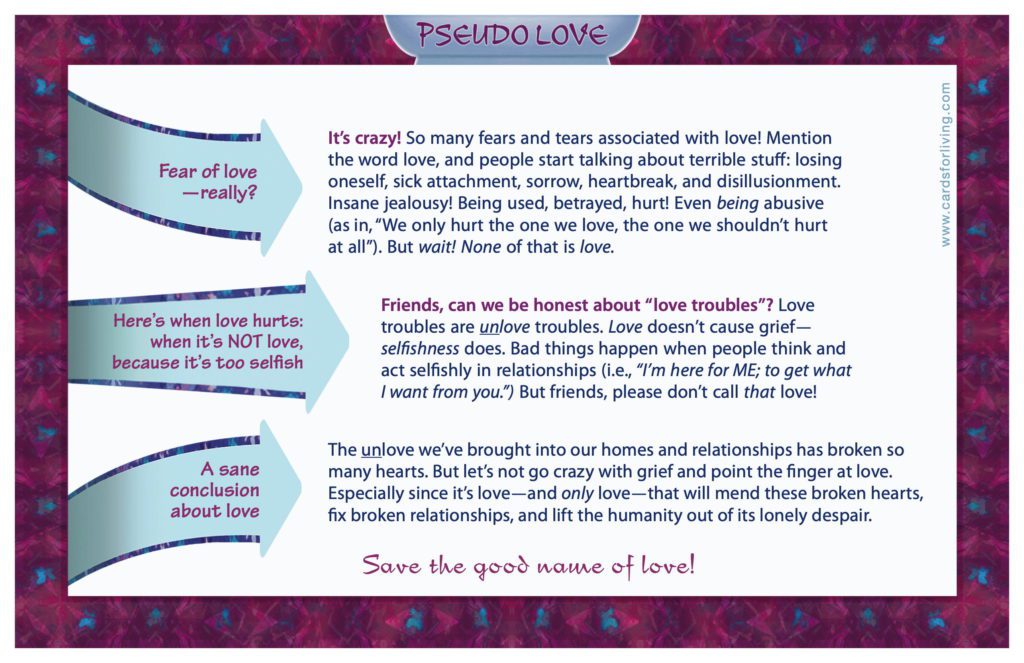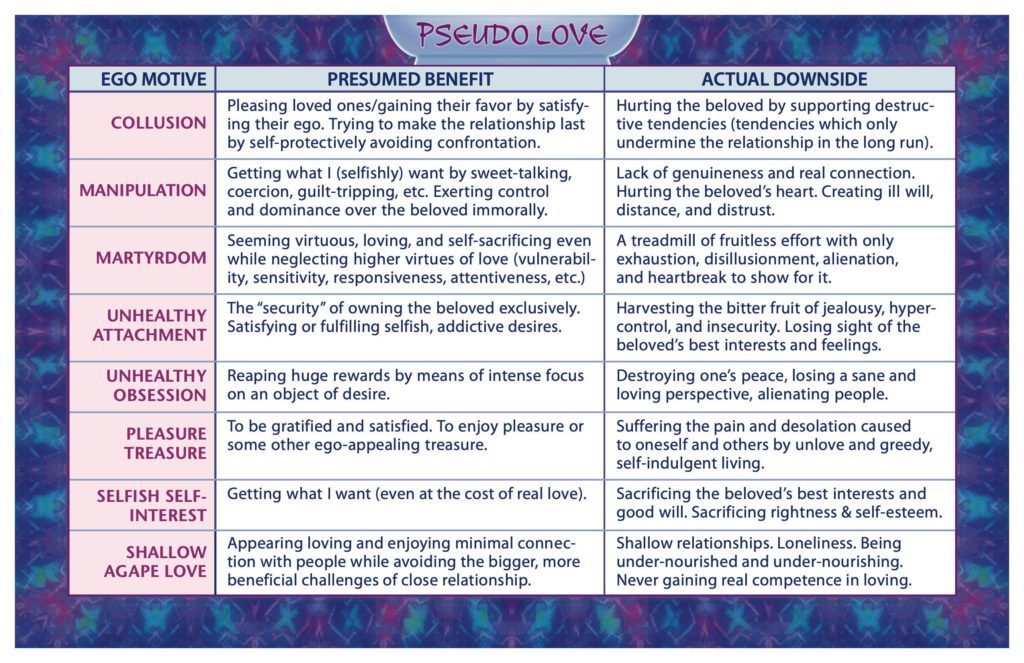

It’s obvious to everyone that difficulty puts love to the test. But who suspects that pleasure also tests our love? Almost no one. And that’s why we’re blindsided when we’re tested by pleasure, and we so often flunk the felicity test.
We’re not used to thinking of pleasure as a test of love. Isn’t love a wonderful source of pleasure, and a great pleasure in itself? Absolutely! There’s nothing wrong with pleasure, and it’s completely natural to pursue whatever we find pleasurable. But there may be plenty wrong with how we handle pleasure, and how our mishandling of pleasure affects our love relationships, and other people and aspects of life that need our love and attention. Once I give a few examples of ways people fail the felicity test, you’ll recognize what I’m talking about.
Some of the most common and obvious ways we fail the felicity test happen when we allow pleasure to distract us from our friends or beloved. Like during sex….
What if one of us becomes so absorbed in our own inward deliciousness that we lose touch with our lover? In the worst case, we will do whatever heightens our own private pleasure at the expense of our partner’s needs and experience. Even if the sex is somewhat enjoyable to both people physically, it is still a huge let down emotionally, to be abandoned right when we feel wide open and most vulnerable. Imagine: At the height of passion, you open your eyes feeling connected with your lover, and find them lost in a swoon…. You’ve jumped, surrendered all your defenses and control—and your lover’s not there to catch you! They’ve been sucked into the whirlpool of their own pleasure, and they’re not even aware how thoroughly that excludes you.
Who you truly are, the wholeness of your being, is also out in the cold when your lover becomes too obsessed with the sexual aspect of your relationship. Their one-track mind doesn’t leave room for the other parts of your life and relationship that need their care and attention.
There are lots of other ways we fail the test of pleasure:
You’re out to dinner with someone, and it feels like you’re competing with the cuisine for their attention—and losing. You start wishing you’d gone to a crappier restaurant….
You’re on the dance floor with your date, and she starts really getting into it. She’s lost in the music, enjoying the kinesthetic pleasure of moving with the beat. Her eyes are closed; you wonder whether she’d even notice if you sat this one out. She’s certainly not dancing with you.
People also get distracted by the bliss of meditation and spiritual raptures. They insist that time with their friends and family has to be scheduled around their practices, which have their top priority. And while hanging onto one of their “lofty” states, they’re hard-pressed to empathize with the more “mundane” feelings and concerns of their loved ones. They don’t want to be “brought down.”
Sexual chemistry is also a test of love. Surprised? That’s understandable. Everyone finds sexual chemistry wonderfully pleasurable and hugely appealing. What could be wrong with that? Well… plenty.
One problem is, sexual attraction is not very discerning—some of us feel its magnetism with practically everybody we meet! And even when its randomness is well-controlled, chemistry is too easily confused with love—although it’s very different from love. Chemistry is addictive; we love the thrill it gives us. We build our relationships around it—and end them when the thrill is gone. Living under its spell, we bypass people and situations that don’t turn us on, even when they legitimately need and deserve our attention. And we rely on chemistry’s powers of distraction to avoid the deeper challenges of love—for example, when we kiss and make up instead of talking through and actually resolving conflicts and disagreements.
Handling pleasure in a love-compatible way is a real challenge. Honestly, it’s easier to pass an adversity test than a felicity test. There’s a higher moral challenge involved in staying outward and loving in a vortex of pleasurable feelings that sweeps us inward, into the position of a taker, an enjoyer, rather than a giver—which is what a lover truly is. Love is giving, through both pleasure and pain.
Remember, love is an orientation to benefitting the beloved. Even if love makes you happy, you want the beloved to be happy. Even when your love returns to you in pleasures and treasures galore, you want to share all you have with your beloved—and never simply indulge in personal pleasure at the cost of abandoning them. When love is strong, love prevails over pleasure, through pleasure, and despite pleasure.
A weak person will flunk the test, becoming totally self-indulgent as soon as pleasure becomes intense. A weak person may eventually decide to avoid pleasure, because they don’t have the courage to face that test, and learn to pass it. But a strong lover has a strong intention to keep loving through pleasure. A strong lover resists becoming overly selfish, or getting their face stuck in the feedbag.
We can’t afford to underestimate the challenge that pleasure represents in love, if we aspire to pass the felicity tests that love and close relationships inevitably bring. We need to prepare ourselves by exercising our muscles of stringless giving every day, practicing living as a giver rather than a bargainer or taker in life. When we can consistently approach sources of great pleasure as a giver, we’ll be able to share the highest pleasures of love and relationship this life can offer.
Let’s call a spade a spade: Love can be a great pleasure, but pleasure is not the same as love. Don’t let the pleasures of love seduce you into enjoying them for their own sake. Love is forever for the beloved, and its pleasures are meant for sharing.
Love is easily confused with feelings and behaviors that are common in close relationships, but aren’t really loving. To learn to how to recognize what love is and isn’t, download or print the Pseudo Love Card from the Cards for Living website.
Love,
Your friends at LoveTrust



